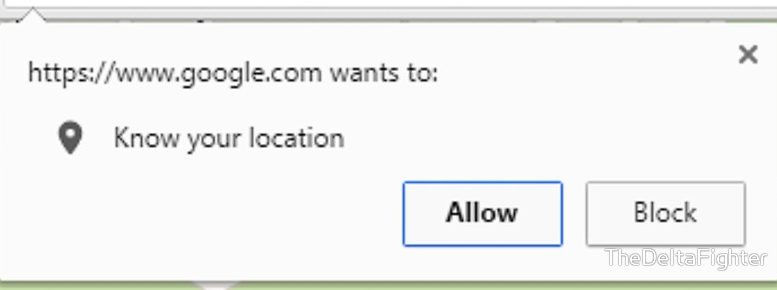All of a sudden we’ve all become much more aware of privacy on the web. Originally it was some of the news about Facebook and other social media. Then Europe enacted new privacy standards. That caused every web site to up its game. In 2024, we are all expecting Google to get rid of “cookies.” While I think that’s a good move it also creates a lot of uncertainty. It’s actually a good thing that we’re all paying a bit more attention, even though it can lead to some annoying popups like the one above.
You’ve probably noticed this “know your location” message on more than one web site, and you might have asked yourself, “why do they need to know?” That’s actually a really good question.
They probably don’t need to know…
When a web site wants to know your location, it may not be to serve your needs. Of course, if you go to Google Maps or a bank web site where you’re looking for the closest branch… that makes sense. They’ll want to know your location. But what if you go to a news and opinion site? Do they really need to know where you are?
The first thing you’d think about is that it’s part of their market research. That would make sense, but Google already collects that information in a really broad way. Any web site’s admin (and that includes me) can find out what cities and towns its visitors come from. That information’s already out there. Not only that, if the site is advertising using Google or Bing, it’s Google or Bing that’s doing the targeting.
…it’s a little more personal than that.
Chances are, if you visit a web site and they want to know your location, it’s for one reason only. They want to serve you ads on their site. If the site knows where you are, they can serve you targeted ads. They can either use Google or Bing, or they can choose the ads themselves. Either way, it’s all about making sure that the ads you see are relevant to you.
What about if you use an ad blocker?
Right now, a lot of people use ad blockers, and it’s obviously a problem for some web sites. I’ve seen more and more sites that limit access to their content if you don’t “whitelist” them and show their ads. I understand, it costs money to run a site and ads provide that money. I don’t think they’re doing the wrong thing, it’s just part of the ongoing battle between users and content providers. We skip ads on TV, they put them in the guide. We block popups, they create in-site ads. We block those, they create a new kind of popup that we can’t block. I’m sure pretty soon there will be a new ad blocker that makes the site think you’re looking at ads when you’re not. It’s a never-ending arms race really, and I’m pretty sure no one will win.
Should you let them know your location?
That’s a personal decision. The funny thing about targeted ads is, if they’re done right they’re actually not that bad. I don’t mind looking at a few ads that actually appeal to me. That’s a tall order though; it’s very hard to get something like that right. Too many ads, or too many of the wrong ads, and I’ll get cranky quickly.
If I’m not blocking ads on a particular site, I generally let them know my location, I figure that if they “really” wanted to know they’d probably find out anyway and it might improve the quality of the ads. If it’s a site I don’t visit much though, I’ll block the ads and block the location. I don’t need them knowing everything all the time… right? On the other hand, there are those people who use private browsing mode all the time or choose a browser like Opera or DuckDuckGo that hides your location all the time. Honestly, it’s your call. I’m curious to see what our Solid Signal community does, so leave a comment below!





